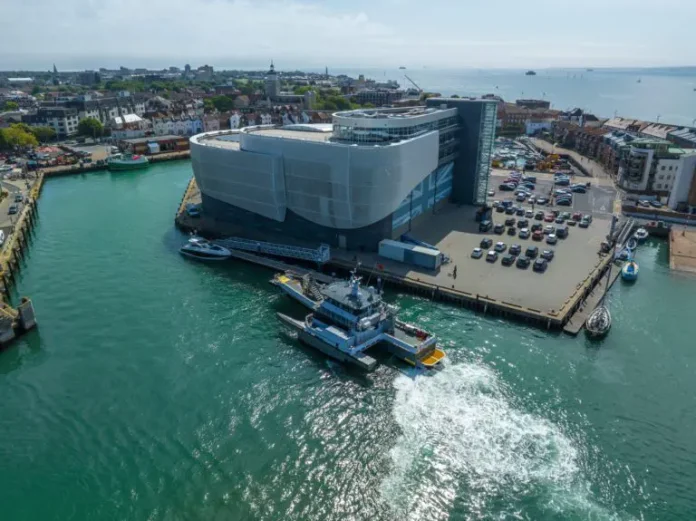BAR Technologies, a simulation-driven marine engineering consultancy, has launched its first BARTech 30 crew transfer vessel (CTV) from its premises on The Camber, Portsmouth, in the U.K. It will be operated by Seacat Services. The vessel was officially named ‘Seacat Columbia’ by Ian Baylis, founder of Seacat Services and Martin Whitmarsh, chair of BAR Technologies and chair of the Offshore Wind Growth Partnership.
The BARTech 30 was designed to address two challenges of the offshore wind industry: vessel efficiency – and therefore emissions reduction – and the comfort in transfer, and subsequent effectiveness, of offshore wind engineers.
In the first instance, many of the major offshore wind developers and owners are now beginning to look in earnest at the rates of fossil fuel consumption in wind farm service vessels. Secondly, any offshore engineering personnel beset by sea sickness in travel to a project must be returned to port – meaning in practice that a vessel transporting up to 24 engineers must cease its transit to a project site – resulting in expensive downtime for the project owner.
With its 30-meter ProA design, and active foiling systems to correct for pitch and roll, the BARTech 30 is able to minimize vessel motion and fuel burn – leading to an average increase in stability across all sea states of up to 70% and a reduction in total emissions of 30% over a typical operational profile – making the vessel one of the first low emission vehicles (LEV) serving the U.K.’s growing fleet of offshore wind farms.
Additionally, with the vessel able to operate in more challenging conditions than the current catamaran designs, offshore wind turbines may be serviced over a greater number of sea states, ensuring wind farm owners have more opportunities to better and more cost effectively provide turbine maintenance.
“BAR Technologies was established to leverage the highest level of engineering expertise and understanding of hydrodynamics from the fields of Formula 1 racing and the Americas Cup respectively, to take on some of the biggest challenges in vessel efficiency and maritime decarbonization,” says Whitmarsh. “Alongside our pioneering wind propulsion technology for the shipping industry, our latest developments in crew transfer vessel design, demonstrated by the BARTech 30, are helping to significantly mitigate the ‘last mile’ of carbon emissions in offshore wind development and construction.”
“We know that the offshore wind industry has led several innovations in cost reduction since its inception,” continues Whitmarsh. “We’re now able to take this efficiency drive one step further with a vessel design not only able to operate in wider offshore parameters and presenting new savings in servicing and maintenance, but, also combined with a significant reduction in fuel consumption.”
“Following our preview of the vessel at the Seawork maritime event in June, we’re thrilled to officially launch the BARTech 30 here at our home in The Camber in Portsmouth,” adds John Cooper, CEO of BAR Technologies. “Having our first customer delivery is a key milestone in our development of the BARTech 30 program, and we look forward to seeing further customer orders for the vessel fulfilled in the near future. In taking this pioneering design to market, we’ve been able to bring in elements of collaboration from other South Coast marine designers and consultancies – and the Isle of Wight based vessel manufacturer – helping to secure a domestic supply chain for a key part of the UK offshore wind industry.”
Alongside the order for two vessels from Seacat Services, CTV operator High Speed Transfers has also ordered two BARTech 30s.




